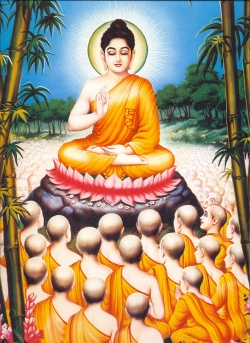Difference between revisions of "The Observance of Ullambana"
m (1 revision: Adminos 26 october) |
|||
| Line 1: | Line 1: | ||
[[File:Buddha19.jpg|thumb|250px|]] | [[File:Buddha19.jpg|thumb|250px|]] | ||
| − | The [[observance]] of Ullambana is based on the story of [[Maudgalyayana]] and his mother. According to popular {{Wiki|Chinese}} [[tradition]], [[Maudgalyayana]] discovered through his [[meditative]] [[powers]] that his mother had been [[reborn]] in one of the [[realms]] of [[misery]]. Distressed over the tormented state of his mother, he approached the [[Buddha]] for help. The [[Buddha]] then advised [[Maudgalyayana]] to make [[offerings]] to the [[Order]]. The [[merit]] of making this [[offering]] would help to relieve the [[suffering]] not only of his mother, but also that of other [[beings]] in the [[realms]] of [[misery]]. It is said that as a result of Maudgalyayana’s [[offering]], his mother was soon released from her [[unhappy]] state. | + | The [[observance]] of [[Ullambana]] is based on the story of [[Maudgalyayana]] and his mother. According to popular {{Wiki|Chinese}} [[tradition]], [[Maudgalyayana]] discovered through his [[meditative]] [[powers]] that his mother had been [[reborn]] in one of the [[realms]] of [[misery]]. Distressed over the tormented [[state]] of his mother, he approached the [[Buddha]] for help. The [[Buddha]] then advised [[Maudgalyayana]] to make [[offerings]] to the [[Order]]. The [[merit]] of making this [[offering]] would help to relieve the [[suffering]] not only of his mother, but also that of other [[beings]] in the [[realms]] of [[misery]]. It is said that as a result of Maudgalyayana’s [[offering]], his mother was soon released from her [[unhappy]] [[state]]. |
| − | As a result of this incident, the act of making [[offerings]] to relieve the [[suffering]] of departed [[parents]] as well as other [[beings]] in the [[realms]] of [[misery]], became a popular communal observances in [[China]]. This is called the [[observance]] of Ullambana, which takes place on the fifteenth day of the seventh [[lunar month]]. To this day, in various parts of the [[world]], Ullambana is still {{Wiki|being}} observed. | + | As a result of this incident, the act of making [[offerings]] to relieve the [[suffering]] of departed [[parents]] as well as other [[beings]] in the [[realms]] of [[misery]], became a popular communal observances in [[China]]. This is called the [[observance]] of [[Ullambana]], which takes place on the fifteenth day of the seventh [[lunar month]]. To this day, in various parts of the [[world]], [[Ullambana]] is still {{Wiki|being}} observed. |
{{R}} | {{R}} | ||
[http://web.singnet.com.sg/~alankhoo/Observances.htm web.singnet.com.sg/~alankhoo] | [http://web.singnet.com.sg/~alankhoo/Observances.htm web.singnet.com.sg/~alankhoo] | ||
Latest revision as of 20:25, 8 March 2015
The observance of Ullambana is based on the story of Maudgalyayana and his mother. According to popular Chinese tradition, Maudgalyayana discovered through his meditative powers that his mother had been reborn in one of the realms of misery. Distressed over the tormented state of his mother, he approached the Buddha for help. The Buddha then advised Maudgalyayana to make offerings to the Order. The merit of making this offering would help to relieve the suffering not only of his mother, but also that of other beings in the realms of misery. It is said that as a result of Maudgalyayana’s offering, his mother was soon released from her unhappy state.
As a result of this incident, the act of making offerings to relieve the suffering of departed parents as well as other beings in the realms of misery, became a popular communal observances in China. This is called the observance of Ullambana, which takes place on the fifteenth day of the seventh lunar month. To this day, in various parts of the world, Ullambana is still being observed.
